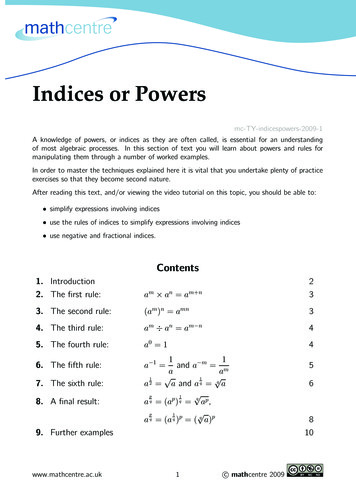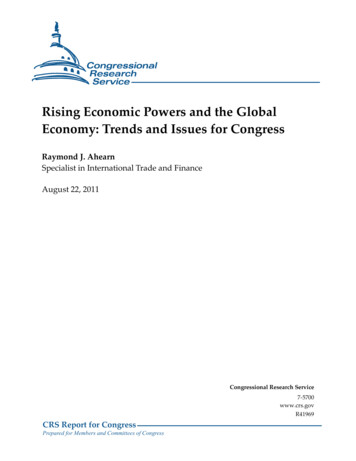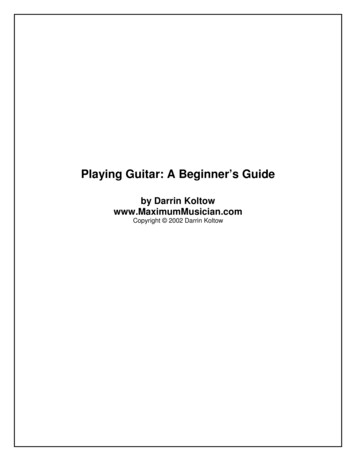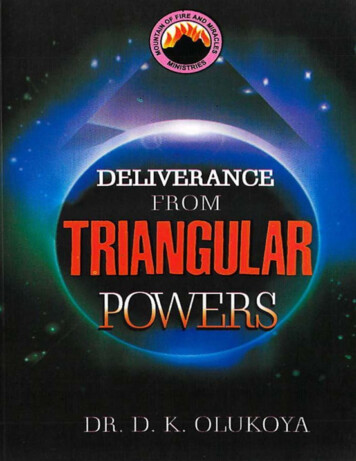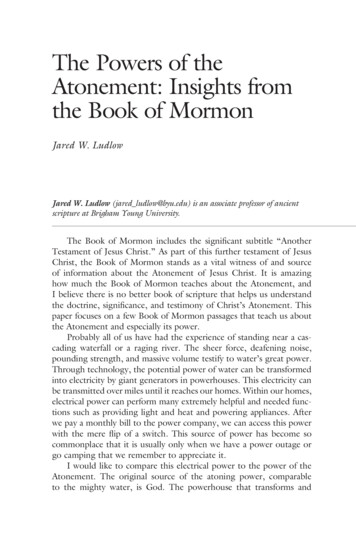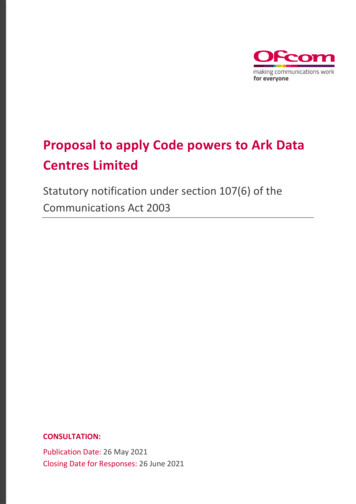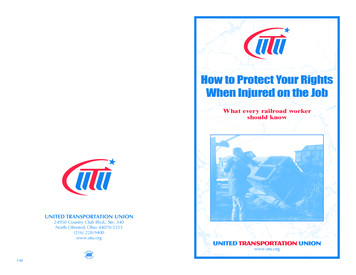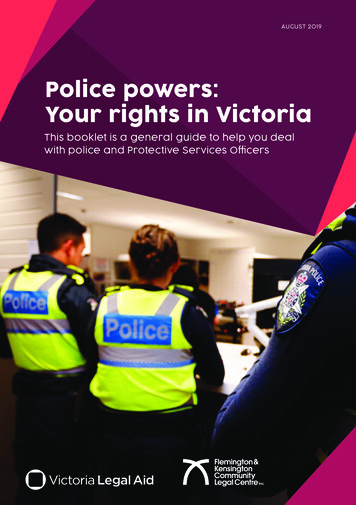
Transcription
AUGUST 2019Police powers:Your rights in VictoriaThis booklet is a general guide to help you dealwith police and Protective Services Officers
Do you need this booklet in a different format?Please ring us on (03) 9269 0234 and ask for Publications. We can talk with you aboutwhat you need.Produced by Victoria Legal AidVictoria Legal Aid570 Bourke StreetMelbourne VIC 3000For free information about the law and how we can help you: visit our website www.legalaid.vic.gov.au call 1300 792 387 Monday to Friday, 8 am to 6 pm, excluding public holidaysFor business queries, call (03) 9269 0234Flemington & Kensington Community Legal Centre22 Bellair StreetKensington VIC 3031Tel: (03) 9376 4355Email: fklegal@fkclc.org.auWebsite: www.policeaccountability.org.auFirst edition 199124th edition 2019 2019 Victoria Legal Aid. This work is licensed under a Creative Commons Attribution 4.0.You are free to re-use the work under that licence, on the condition that you credit VictoriaLegal Aid as author, indicate if changes were made and comply with other licence terms.The licence does not apply to any images, photographs or branding including the VictoriaLegal Aid logo.Cover image: Copyright Victoria Police. Not to be used or reproduced without permission.Disclaimer: The material in this publication is a general guide only. It is not legal advice. Ifyou need to, please get legal advice about your own particular situation.Changes to the law: The law changes all the time. To check for changes you can visit ourwebsite or call us.ISBN 978 1 921949 04 3Printed on recycled paper consisting of 50% post consumer waste and 50% certified fibrefrom controlled wood sources.1907 0174 PP CL
CONTENTSAbout this booklet1What do these words mean?2Name and address4Searches6Police body cameras12Arrest and being held in custody14Interviews and statements18Photos, ID parades, fingerprints and body samples22Being released from custody27Cognitive impairment29Mental illness30Move on powers32Traffic offences33Fines36Protective Services Officers38Making a complaint40Where to get help44
Victoria Legal AidVictoria Legal Aid is a government-funded agency set up to ensure thatpeople who cannot afford to pay for a private lawyer can get help with theirlegal problems. We provide free information for all Victorians, family disputeresolution for disadvantaged families, provide lawyers on duty in most courtsand tribunals in Victoria, and fund legal representation for people who meet oureligibility criteria. We help Victorian people with legal problems about criminalmatters, family breakdown, child protection, family violence, child support,immigration, social security, mental health, discrimination, guardianship andadministration, tenancy and debt.Flemington & Kensington Community Legal Centre (FKCLC)FKCLC runs a specialist Police Accountability Project, providing strategiccasework, public interest litigation, evidence-based research, community legaleducation, support and policy and law reform.The Police Accountability Project is a state-wide, free legal service thataims to assist people who have experienced racial discrimination, abuse,harassment and violence by police or failures by police to respond effectivelyor appropriately to family violence. Our service assists clients with free legaladvice, support and information to explore legal avenues to hold policebehaviour to account, seek justice and create systemic change.
ABOUTTHIS BOOKLETWhat this booklet coversThis booklet is a general guide to help you when you deal with the police. It focuseson what police can and cannot do. The booklet covers things like arrest, being held incustody and searches. It also includes information about Protective Services Officers(PSOs).When dealing with the police and PSOs, it is important to remember that youhave rights.Getting more helpThis booklet gives general information, not legal advice. We have put the contactdetails of helpful organisations in the ‘Where to get help’ section on page 44.Legal wordsWe use legal words in this booklet. To help you, we have explained some words in‘What do these words mean?’ on the next page.About this booklet1
WHAT DO THESEWORDS MEAN?In every section of this booklet, we highlight legal words in bold when theyfirst appear. The definitions for these words are below. We have also includedother legal words that you might hear used.appeal – asking higher court, tribunal or government department for a decisionto be reversedapprehend – when the police hold you. You are not free to leavearrest – when the police keep you in custody because they think you broke the lawbail – a promise to go to court to face charges on a certain date. Bail may haveconditions, such as reporting to the police or living at a certain placebail justice – a person who comes to the police station to decide if you get bailbreach – to break a law or court orderbreach of peace – to cause a disturbance to the publiccharge – the crime the police say you have committedconsent – free agreement to do somethingcourt order – where the court says you must do something. For example, come tocourt again or write a letter of apology. It can also be a document that sets out yourpenalty if you are found guilty of breaking the lawcriminal record – a record of the crimes a person has been found guilty of and thepunishment they gotcustody – under arrest. You are not free to leaveevidence – information (documents or witnesses) used by the court or tribunal tomake a decisionindependent person – an adult who must be with you during police questioning if youare under 18 and your parents or guardian cannot be thereIndependent Third Person – a trained person who must be with you during policequestioning if you have a cognitive impairment. They help you understand what ishappening and what your rights areindictable offence – a serious offencemagistrate – a person in the Magistrates’ Court who decides whether someone isguilty or not, and what punishment they getnotice to appear – a document that tells you to go to court on a certain date2
offence – an action the law says is wrong (illegal). See chargepenalty – punishment for breaking the lawreasonable belief – a belief that an ordinary and reasonable person would havein the same situation. Reasonable belief must be factually based. It is more thana feelingreasonable force – acting in a way which is appropriate (not excessive)seize – when the police take items as evidencestatement – a signed document of what you say happened. A statement can be usedin courtsummary offence – a less serious offencesummons – a document that says when and where to go to courtsuspect – the person police think is guilty of a crimewarrant – a court document saying what the police can do, such as to arrestsomeone or search them or their propertywitness – a person who gives evidence at courtWhat do these words mean?3
NAME ANDADDRESSDo I have to give my name and address?You must give your name and address in all of the circumstances below. It isthe law. It is a crime to refuse to give police your name and address in thesecircumstances. It is also a crime to give the police a false name and address.In generalA police officer can only ask you to give your name and address if they have areasonable belief you: committed an offence are about to commit an offence.The police officer must tell you what crime they think you committed.For example, a police officer can ask you for your age, name and address if they havea reasonable belief that you bought alcohol and you are under 18.It is a crime to help someone commit an offence. What police define as helpingcan be quite broad. You can be charged even if you were not at a crime but helpin another way. For example, swapping clothes with someone before or after theycommit a crime. If police ask you questions about this offence and ask for your nameand address, you must give your name and address.DrivingThe police officer may signal for you to stop driving. You must: stop show the police officer your licence or learners permit tell the police your name and address if they ask.Helping policeThe police officer may believe you saw a serious crime (an indictable offence).The police officer may think you have information that could help them. You mustgive the police your name and address if they ask you.The police officer must tell you what crime they think you can help them with.4
Can I get the name of the police officer?Yes. If you ask, the police officer must give you: their name their rank the police station where they work.Ask for these details in writing if you feel safe to do so. This information may be usefulif you want to complain about the police officer.If a police officer has asked you for your name and address and then does not give youtheir name, rank and police station when you ask, they can be fined.Make a complaint for this to happen. A lawyer can help you do this. See ‘Making acomplaint’ on page 40.Do I have to answer any other questions?No. You do not have to answer any other questions after you have given your nameand address.Police can ask you questions as a witness. Police can also ask you questions as asuspect. The police must tell you if they think you are a suspect for a crime. They musttell you your rights before they ask you questions. See ‘Interviews and statements’ onpage 18.If the police officer tells you that you are breaking the law by not answering questions,ask to speak to a lawyer.The police officer may use anything you say to them to arrest or charge you. Thereis no such thing as speaking ‘off the record’. The police could use what you say asevidence in court to show that you broke the law.What if someone was using my car?If someone was using your vehicle and the police officer asks you for that person’sname, you must give it. If you do not, the police could charge you with a crime. Youcould lose your licence for two years or more if you are found guilty.Name and addressRemember: the law requires you to give your name and address to the policeif they ask.Can a police officer ask for my phone number?They can ask. You do not have to give it to them.5
SEARCHESCan a police officer search me?In general, a police officer can search you if they have: a warrant arrested you.Police officers must write down that they searched you. You can ask for a copy of thiswritten record. You can ask for it at the time or later. You can get the written record forfree if you ask for it within one year of the search.When can a police officer search me without a warrant?Searches by consentIf the police officer does not have a warrant or the power to search you, they mightask you if you will let them search you. This is called a ‘search by consent’.You can say ‘No’.If you say ‘Yes’, the police officer should get your agreement in writing. You cancomplain if this does not happen. See ‘Making a complaint’ on page 40.Talk to a lawyer if you only said ‘Yes’ to a search because you felt scared, or the policetold you that you had to let them search you. See ‘Where to get help’ on page 44.Searches in a ‘public place’The police officer does not need a warrant to search you in a public place if theyreasonably believe you have: illegal drugsthings that can explode or catch firea gun, knives, imitation guns, knuckle-dusters or nunchakussomething that could be used to make graffiti. For example, spray paint or evena texta.A public place includes: a shopin or around a train station, or on public transport (buses, trams or trains)a schoola churcha hospital or welfare centre, like the Salvation Armyan open space, like Federation Square.Police can say they have reasonable grounds to search you if you are in an area wherethere is lots of violence crime or graffiti.6
The police officer can search your car and anything you are carrying. The police cansearch your car even if you are not in it.Note: to search you for a graffiti offence, the police officer must reasonablybelieve you are 14 or older. You must also be on or near public transportproperty or trespassing on someone else’s property.Searches in public ‘designated areas’The police can search you for weapons in public areas which are ‘designated areas.’A senior police officer can make a public area into a designated area if it: is a regular trouble spot such as King Street in the city has had two or more events of violence or disorder in the last 12 months has had events or demonstrations that have been violent.The police should tell people that a public area has become a designated area. Theyshould publish this in a local newspaper. They do not have to do this if they havemade a public area into a designated area at short notice.Police have a lot of search powers in ‘designated areas.’ For example, police: do not need a warrantdo not need to have any reasonable grounds to believe you are carrying a weaponcan search you, your bags or your car for weaponscan do searches in these areas for up to 12 hours.Before searching anyone, the police officer must give the person a written searchnotice. This will say that: the area has become a designated areayou or your vehicle are in that designated areathe police have the power to search youit is a crime to stop the police searching you.Protective Services Officers may be able to search you too. See ‘Protective ServicesOfficers’ on page 38.SearchesIf a police officer asks to search you because you are in a designated area, you mustlet them. It is an offence to say no, or refuse in another way.You can contact Victoria Legal Aid or a community legal centre if you need helpafterwards. See ‘Where to get help’ on page 44.7
Searches on private propertyA police officer usually needs a warrant to enter and search private property. Forexample, your home.The police officer may enter your property without a warrant when: you agree to let the police officer in the police officer has a reasonable belief that someone c
Photos, ID parades, fingerprints and body samples 22 Being released from custody 27 Cognitive impairment 29 Mental illness 30 Move on powers 32 Traffic offences 33 Fines 36 Protective Services Officers 38 Making a complaint 40 Where to get help 44 CONTENTS. Victoria Legal Aid Victoria Legal Aid is a government-funded agency set up to ensure that people who cannot afford to pay for a private .
